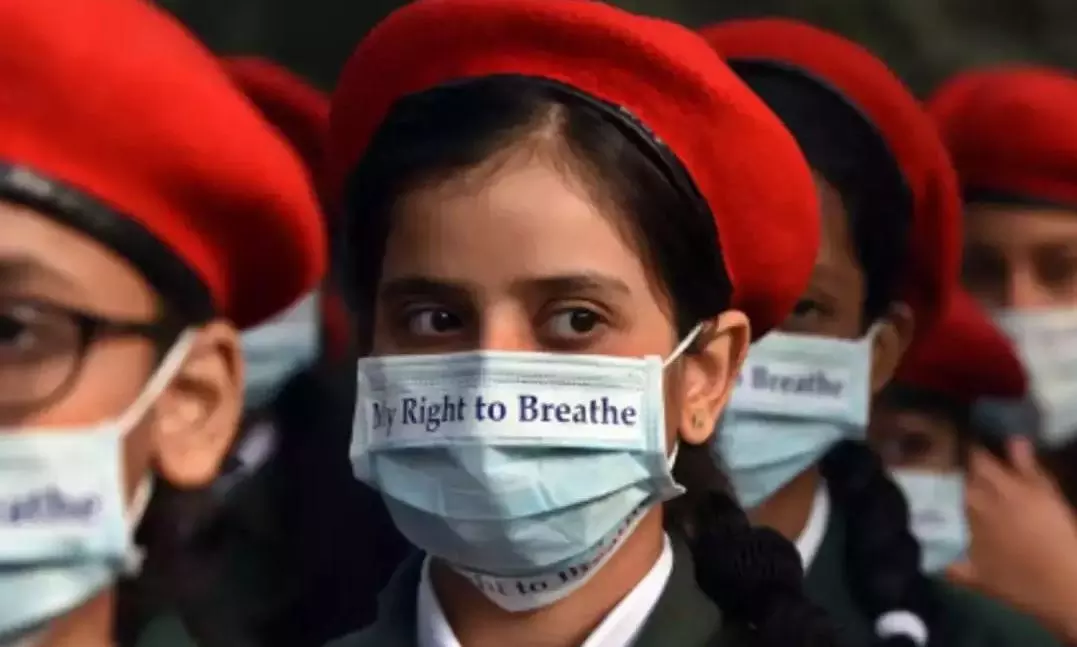
Air pollution led to 16 lakh deaths in India in 2021, says Lancet report
text_fieldsAir pollution was responsible for an estimated 16 lakh deaths in India in 2021, with emissions from fossil fuels, including coal and liquid natural gas, accounting for 38% of these fatalities, according to a report by medical journal The Lancet.
Released on Tuesday, The Lancet Countdown on Health and Climate Change 2024 details the severe health impacts of pollution, exacerbated by fossil fuel dependence, and urges swift action towards renewable energy adoption.
The report warns that the continued reliance on fossil fuels and biomass is a major contributor to air pollution, which raises the risk of respiratory and cardiovascular diseases, lung cancer, diabetes, neurological disorders, adverse pregnancy outcomes, and overall disease burden.
These health issues contribute significantly to India's high mortality rates and underscore the urgency for an energy transition. Despite renewable energy providing a record 11% of India’s electricity in 2022, coal continues to dominate with a 71% share in electricity generation, highlighting the scale of the challenge ahead.
India’s air quality crisis is also reflected in the country’s PM2.5 emissions. In 2022, India contributed to 15.8% of global consumption-based PM2.5 emissions and 16.9% of production-based emissions, making it the second-highest emitter worldwide. PM2.5 particles are about 30 times smaller than human hair and can infiltrate the lungs and bloodstream, posing a significant risk to health.
The report noted that 2023 was globally the hottest year on record, characterized by extreme temperatures and unusual precipitation patterns that brought about severe droughts, destructive forest fires, storms, floods, and deadly heatwaves.
India, in particular, has been severely impacted by rising temperatures, with Indian infants experiencing an average of 7.7 heatwave days annually between 2014 and 2023, while adults over 65 faced 8.4 such days—marking an increase of 47% and 58%, respectively, compared to 1990–1999.
This intensifying heat also had economic consequences; India lost approximately 181 billion potential labour hours in 2023 due to heat exposure, translating into an estimated $141 billion (over Rs 11 lakh crore) in lost income.
Climate change has also accelerated the spread of infectious diseases, with India witnessing an 85% increase in dengue transmission between the 1950s and 2023. Rising temperatures and changing precipitation patterns have been conducive to the spread of diseases like dengue, malaria, and West Nile virus-related illnesses.
Reacting to the report’s findings, Congress MP and former Union Environment Minister Jairam Ramesh urged the government to prioritize air pollution in its administrative agenda. He argued that curbing stubble burning alone would not suffice, as it provides only a short-term solution. Instead, Ramesh called for a “re-imagining” of India’s economic and sustainability model, advocating for a large-scale transition to renewable energy, electric vehicles, and enhanced public transportation infrastructure.
The Congress leader also recommended updating the Air (Prevention and Control of Pollution) Act, 1981, which he argued should be reformed to reflect the public health implications of air pollution.





